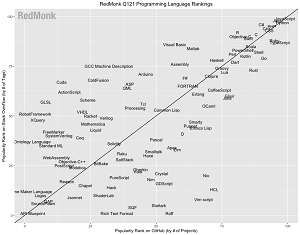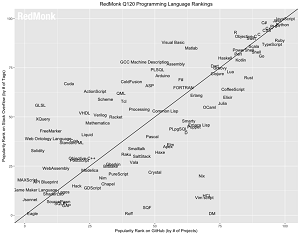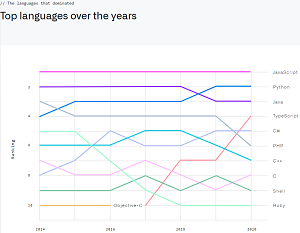News
Analyst: TypeScript Now Firmly in Top 10 Echelon (Ruby, Not So Much)
RedMonk analyst Stephen O'Grady, who tracks programming language popularity, believes TypeScript has achieved the rare feat of firmly ensconcing itself into the top 10 echelon, now questioning how high it might go.
The year's first (Q121) edition of the RedMonk Programming Language Rankings (published in March and dated January) shows TypeScript at the No. 8 position, a one-step jump up for Microsoft's type-optional take on JavaScript, recently shipped in v4.2.
This ranking draws upon GitHub for code-use metrics and Stack Overflow for discussion activity. It's one of several similar initiatives that use different methodology to gauge programming language popularity or usage. "The idea is not to offer a statistically valid representation of current usage, but rather to correlate language discussion and usage in an effort to extract insights into potential future adoption trends."
One potential future adoption trend for TypeScript points straight up.
"TypeScript's ascent up our rankings continues," O'Grady said. "This is impressive on its own rights; the only language in recent memory to penetrate the Top 10 was Swift, but that was for a single quarter and it quickly bounced back out and has remained relatively static since 2018 in 11th place.
"The initial question facing TypeScript was whether it would be able to hold on. The more appropriate question now is what the language's ultimate ceiling might be. TypeScript moved up for the sixth of its latest eight quarterly rankings, and its popularity is evident when one looks around the industry."
Overall, the latest ranking showed a lot of movement compared to the previous fairly static measurement, with a lot of ties:
1 JavaScript
2 Python
3 Java
4 PHP
5 C#
5 C++
5 CSS
8 TypeScript
9 Ruby
10 C
11 Swift
12 R
13 Objective-C
14 Shell
14 Scala
16 Go
17 PowerShell
18 Kotlin
19 Rust
19 Perl
These two charts show the Q121 rankings compared to Q120:
 [Click on image for larger view.] RedMonk Q121 Programming Language Rankings (source: RedMonk).
[Click on image for larger view.] RedMonk Q121 Programming Language Rankings (source: RedMonk).
 [Click on image for larger view.] RedMonk Q120 Programming Language Rankings (source: RedMonk).
[Click on image for larger view.] RedMonk Q120 Programming Language Rankings (source: RedMonk).
"Fully half of the Top 20 experienced a degree of movement, which is very unusual," O'Grady said. "It's difficult to attribute this definitively to any higher level macro trends, but the data is consistent with an industry that picked the pace back up in the last two quarters of the year after the initial chaos of lockdowns and so on gave way to livable if extremely suboptimal new routines."
TypeScript's rise wasn't a surprise, though, because O'Grady has been tracking its ascent for some time.
"Instead of retreating back to the 10-15 range, the JavaScript-compatible language continued to gain, moving from tenth place to ninth," he said of the Q120 rankings a year ago. "As with Python, TypeScript is succeeding in part because of patterns. Instead of versatility, however, TypeScript is buoyed by both its ability to intermingle with a large existing codebase in JavaScript and its potential ability to make the resulting code safer. This has proven to be a winning combination, one which raises expectations from whether or not the language belongs in the Top 10 to how much higher -- if at all -- it might go."
RedMonk's take on the language was backed up by similar studies. For example, the huge GitHub Octoverse 2020 report from last December showed TypeScript rising up three slots from the previous study.
 [Click on image for larger view.] Top Programming Languages Over Time (source: GitHub 2020 Octoverse).
[Click on image for larger view.] Top Programming Languages Over Time (source: GitHub 2020 Octoverse).
While noting the growth of TypeScript in his latest ranking, O'Grady indicated its ascension came at the expense of Ruby, a once-darling member of the programming language pantheon.
"When we started doing these rankings in 2012, Ruby was the fifth most popular language we ranked, and for about five years it was able to maintain that status," he said. "Since 2016, however, Ruby has been gradually slipping, and this quarter it was passed by both CSS (yes, we know many of you don't believe it should be ranked) and the aforementioned TypeScript."
Note that the Octoverse graphic above shows the same thing, with Ruby almost dropping off the table.
About the Author
David Ramel is an editor and writer at Converge 360.